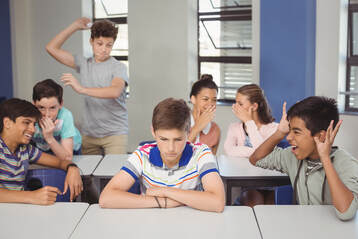 Many educators worry about their students being bullied, or if they have one with bullying tendencies what to do about it. Many people out there think that we are making too much of a fuss about it, that we should leave kids to their own devices. I tend to disagree. I remember the name of the person who tormented me in school. You see, she used to call me, “Stork'' because I was taller than most kids in my class and had very long legs. I didn’t like it but in those days you just had to ignore it. So, How Do You Know If A Child Is Being Bullied? Peggy Moss, a nationally known expert on bullying and a tireless advocate for the prevention of hate violence,and also an author of the book Say Something, Our Friendship Rules, co-authored by Dee Dee Tardiff, and One of Us gives us some advice here… There’s a good chance a child won’t walk up to you and say, “I’m getting teased and bullied at school, the kids are calling me names.” Instead, it’s going to manifest itself by a child saying, “I don’t want to be at school today.” If this seems to be happening a lot, consider the possibility that bullying might be the reason behind the sick days. For boys, one classic symptom is that they are teased so much about being gay or being atypical that they’re terrified to go to the bathroom. Since there’s only one way in and one way out of a bathroom, it’s an ideal place to tease other kids. Boys who are bullied often won’t go all day. These are all possible signals that your child might be the target of teasing at school. As an educator, add “Bullying” to your radar when you’re trying to figure out what’s going on with a child. Peggy says that the injury is real when kids get teased. Unchecked, it can be devastating - Source:EmpoweringParents.com Tips For Educators When A Child Is Being Bullied... Listen with Compassion. Be present to the child especially when strong feelings come up. Whether they are feeling sad, angry or scared it always helps to have an adult there who is listening with compassion and is showing genuine concern. Practice compassionate listening by bringing your attention away from your head and moving it into your heart space. It’s about letting go of judgements about the situation and just seek to understand. If you show anger at the person who is bullying the child it will only make matters worse. Let the child talk about it. As I’ve already mentioned, listen in a non-judgmental way about their experience and about the teaser. Let the child talk. As an educator some personality styles will try to solve the problem, however this is not helpful. Just ask them: “What happened? How did that make you feel?” Don’t assume anything. Yes, that’s right. Don’t assume that the child has done something to bring on the teasing. Teasing isn’t always logical, and for the child it doesn’t matter why - it just matters that it’s happening. Therefore, don’t say, “What did you do that made them tease you?” That’s not going to help. Ask “Cup emptying” questions. Linda Kavelin-Popov has a great strategy she teaches in her book, The Families Virtues Guide, for allowing a child to empty their cup of feelings. Linda says that good cup-emptying questions can be very general, or they can zero in on the feelings the child is expressing. For example, if the child is crying you just ask, “Johnny, tell me, what are those tears about”? Here’s some examples of general questions that will support a child to empty their cup:
I hope as a educator, these ideas and tips will support and encourage you when one of your students is being bullied. I invite you to use cup-emptying questions when you see a child expressing strong feelings of hurt or anger.
0 Comments
|
AuthorHi I'm Sandra Davis. I'm really passionate about supporting others to be the best they can be through sharing my stories and experiences I've has gained along the way through these Blog posts... Archives
July 2024
Categories |
 RSS Feed
RSS Feed